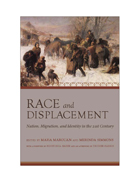2 books by Manzella, Abigail G. H.

Migrating Fictions
Gender, Race, and Citizenship in U.S. Internal Displacements
Abigail G. H. Manzella
The Ohio State University Press, 2018
Winner, 2021 Society for the Study of American Women Writers Book Award
Winner, 2021 CCCC Outstanding Book Award
Migrating Fictions analyzes the role of race, gender, and citizenship in the major internal displacements of the 20th century in history and in narrative. Surveying the particular tactics employed by the United States during the Great Migration, the Dust Bowl, the Japanese American incarceration, and the migrant labor of the Southwest, Abigail G. H. Manzella reveals how the country’s past is imbued with governmentally (en)forced movements that diminished access to full citizenship rights for the laboring class, people of color, and women.
This work is the first book-length study to examine all of these movements together along with their literature, including Zora Neale Hurston’s Their Eyes Were Watching God, Sanora Babb’s Whose Names Are Unknown, Julie Otsuka’s When the Emperor Was Divine, Helena María Viramontes’s Under the Feet of Jesus, and Jesmyn Ward’s Salvage the Bones. Manzella shows how the United States’ history of spatial colonization within its own borders extends beyond isolated incidents into a pattern based on ideology about nation-building, citizenship, and labor. This book seeks to theorize a Thirdspace, an alternate location for social justice that acknowledges the precarity of the internally displaced person.
Winner, 2021 CCCC Outstanding Book Award
Migrating Fictions analyzes the role of race, gender, and citizenship in the major internal displacements of the 20th century in history and in narrative. Surveying the particular tactics employed by the United States during the Great Migration, the Dust Bowl, the Japanese American incarceration, and the migrant labor of the Southwest, Abigail G. H. Manzella reveals how the country’s past is imbued with governmentally (en)forced movements that diminished access to full citizenship rights for the laboring class, people of color, and women.
This work is the first book-length study to examine all of these movements together along with their literature, including Zora Neale Hurston’s Their Eyes Were Watching God, Sanora Babb’s Whose Names Are Unknown, Julie Otsuka’s When the Emperor Was Divine, Helena María Viramontes’s Under the Feet of Jesus, and Jesmyn Ward’s Salvage the Bones. Manzella shows how the United States’ history of spatial colonization within its own borders extends beyond isolated incidents into a pattern based on ideology about nation-building, citizenship, and labor. This book seeks to theorize a Thirdspace, an alternate location for social justice that acknowledges the precarity of the internally displaced person.
[more]

Race and Displacement
Nation, Migration, and Identity in the Twenty-First Century
Edited by Maha Marouan and Merinda Simmons
University of Alabama Press, 2013
Race and Displacement captures a timely set of discussions about the roles of race in displacement, forced migrations, nation and nationhood, and the way continuous movements of people challenge fixed racial definitions.
The multifaceted approach of the essays in Race and Displacement allows for nuanced discussions of race and displacement in expansive ways, exploring those issues in transnational and global terms. The contributors not only raise questions about race and displacement as signifying tropes and lived experiences; they also offer compelling approaches to conversations about race, displacement, and migration both inside and outside the academy. Taken together, these essays become a case study in dialogues across disciplines, providing insight from scholars in diaspora studies, postcolonial studies, literary theory, race theory, gender studies, and migration studies.
The contributors to this volume use a variety of analytical and disciplinary methodologies to track multiple articulations of how race is encountered and defined. The book is divided by editors Maha Marouan and Merinda Simmons into four sections: “Race and Nation” considers the relationships between race and corporality in transnational histories of migration using literary and oral narratives. Essays in “Race and Place” explore the ways spatial mobility in the twentieth century influences and transforms notions of racial and cultural identity. Essays in “Race and Nationality” address race and its configuration in national policy, such as racial labeling, federal regulations, and immigration law. In the last section, “Race and the Imagination” contributors explore the role imaginative projections play in shaping understandings of race.
Together, these essays tackle the question of how we might productively engage race and place in new sociopolitical contexts. Tracing the roles of "race" from the corporeal and material to the imaginative, the essays chart new ways that concepts of origin, region, migration, displacement, and diasporic memory create understandings of race in literature, social performance, and national policy.
Contributors: Regina N. Barnett, Walter Bosse, Ashon T. Crawley, Matthew Dischinger, Melanie Fritsh, Jonathan Glover, Delia Hagen, Deborah Katz, Kathrin Kottemann, Abigail G.H. Manzella, Yumi Pak, Cassander L. Smith, Lauren Vedal
[more]
READERS
Browse our collection.
PUBLISHERS
See BiblioVault's publisher services.
STUDENT SERVICES
Files for college accessibility offices.
UChicago Accessibility Resources
home | accessibility | search | about | contact us
BiblioVault ® 2001 - 2024
The University of Chicago Press









